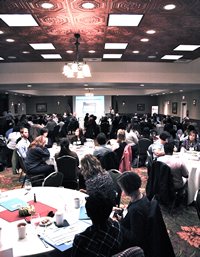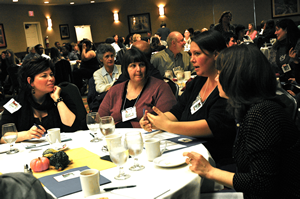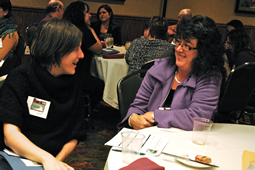 Oregon nonprofit groups shared ideas to give everyone in the state opportunities to better themselves financially at the “Rebuilding the Path of Opportunity: 2011 Asset Builders’ Conference” held in Silverton last week. Over 100 professionals from community development corporations, family centers, community action agencies, micro-enterprise organizations, housing authorities, and social services agencies joined together to share and learn how to build financial assets for all Oregonians. The conference was hosted by Neighborhood Partnerships, CASA of Oregon, and NeighborWorks Umpqua.
Oregon nonprofit groups shared ideas to give everyone in the state opportunities to better themselves financially at the “Rebuilding the Path of Opportunity: 2011 Asset Builders’ Conference” held in Silverton last week. Over 100 professionals from community development corporations, family centers, community action agencies, micro-enterprise organizations, housing authorities, and social services agencies joined together to share and learn how to build financial assets for all Oregonians. The conference was hosted by Neighborhood Partnerships, CASA of Oregon, and NeighborWorks Umpqua.
Margaret Van Vliet, Director of Oregon Housing and Community Services, opened the conference. Oregon Housing and Community Services plays a key role in expanding opportunities for low income Oregonians throughout Oregon. She addressed how the Oregon Individual Development Account Initiative (IDA) is an important program in the Department’s effort to build assets for lower income Oregon families and that she valued the many deeply committed and talented individuals and organizations that make the Initiative work.
Neighborhood Partnerships is a leader in asset building programming and policy in Oregon. NP houses the Oregon IDA Initiative, which is the largest state IDA program in the country. In addition, NP both leads and collaborates with others to promote and defend other policies that support financial stability in lower income families, such as legislation for low income housing and reductions to TANF. Kathy Turner, Program Director with Neighborhood Partnerships and the Oregon IDA Initiative states, “As the lead partner in developing the conference, we are very pleased with the level of engagement by our partners. Our shared vision is to create pathways of opportunity for all Oregonians–we all benefit when all of Oregon families and communities are thriving. This conference is an opportunity for partners to come together, share our best ideas, creatively address challenges, gain new perspectives and tools, and energize ourselves for the coming year.”
 The conference featured several hands-on workshops about how to provide financial education, an introduction to financial coaching, how to support savers, how to protect assets, how to work with vulnerable populations, how to use behavioral economics in program planning, how to develop a banking program for folks who don’t typically use financial institutions, and much more. For example, Rebekah Barger, a program manager for NeighborWorks Umpqua, presented a session on how to build an IDA program focused on youth. As part of her workshop, she unveiled a newly minted financial education program designed to engage young adults.
The conference featured several hands-on workshops about how to provide financial education, an introduction to financial coaching, how to support savers, how to protect assets, how to work with vulnerable populations, how to use behavioral economics in program planning, how to develop a banking program for folks who don’t typically use financial institutions, and much more. For example, Rebekah Barger, a program manager for NeighborWorks Umpqua, presented a session on how to build an IDA program focused on youth. As part of her workshop, she unveiled a newly minted financial education program designed to engage young adults.
When asked about the importance of financial education, Barger said money management skills need to start early. NeighborWorks Umpqua teaches young people about financial fitness and saving for college through a special program called “Gear Up.” Barger says the “Gear Up” program is a real eye-opener for most teens. “No matter how prepared they are, the kinds of things that they stumble over and have a hard time really absorbing, and almost are in denial of, are the realities of what it costs to live.” Personal finance isn’t a required course in Oregon schools. Barger believes it should be, and that it should be taught starting in junior high or earlier.
 The conference also included presentations and discussions about national and state policy issues that impact lower income Oregonians. One such topic was credit and financial products and their impact on our low income neighbors. Carmina Lass, Program Director of Innovative Changes, a Portland group which makes microloans to people whose only other option might be an expensive payday loan, says she sees all the unrest today about banks and fees in a positive light. She says it could make people smarter about money. “People are really seeing the opportunity to take charge of their finances–working on better financial planning, better choices in terms of credit, but also learning how to evaluate financial institutions and the products that they offer, and find better products that meet their needs.”
The conference also included presentations and discussions about national and state policy issues that impact lower income Oregonians. One such topic was credit and financial products and their impact on our low income neighbors. Carmina Lass, Program Director of Innovative Changes, a Portland group which makes microloans to people whose only other option might be an expensive payday loan, says she sees all the unrest today about banks and fees in a positive light. She says it could make people smarter about money. “People are really seeing the opportunity to take charge of their finances–working on better financial planning, better choices in terms of credit, but also learning how to evaluate financial institutions and the products that they offer, and find better products that meet their needs.”
The importance of having a stronger financial foundation is underscored by a recent research. In an emergency, according to the National Bureau of Financial Research, half of all American households would be unable to come up with $2,000 within 30 days, and about one in five would have to pawn something to get it.
Lass says that’s a good reason to start budgeting and saving. “Managing your money is stressful at any income level, and so the first step is just to start thinking about how to plan. Whatever there is, planning–just the act of planning out, for the next month, or next week, or even for the next day–is something that can help decrease the stress.”
At the closing plenary, Nita Shah, Executive Director of Microenterprise Services of Oregon summed up a core value for those present, “Poverty is unacceptable. We should never allow ourselves to look at a person who is poor and be complacent.” Panelists shared case studies of individuals who have worked to change their lives–which highlighted the critical functions that practitioners provide with financial education, coaching, encouragement, training, and more. The conference ended on a note of both concern and optimism for the future–those present recognize that the economic challenges of low income families may be increasing in the coming years, but they remain committed to creating pathways to prosperity for our neighbors across Oregon.
During the conference, the Public News Service wrote several stories on the conference and Oregon’s role in the national asset building movement. You can read them here and here.
